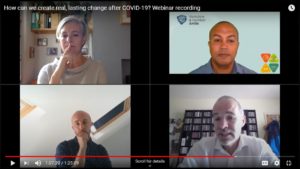How can we create real, lasting change after COVID-19?
Posted: 7th July 2020
If you missed last week’s webinar exploring how our region can understand and adapt the best COVID-19-related innovations into everyday working practice, then you can now watch a full video recording of it. Or read this highlight report. The webinar, which attracted an audience of over 250, was chaired by our Chief Executive Richard Stubbs. He was joined by a panel of speakers:
- Rob Webster, Chief Executive, West Yorkshire and Harrogate Health and Care Partnership
- Katherine Ward, Chief Commercial Officer, Healthy.io
- Michael Wood, Head of Health Economic Partnerships, NHS Confederation
Welcome and Introduction
 Richard Stubbs, Chief Executive of Yorkshire & Humber AHSN, set the scene. He highlighted our partnership with NHS Confederation and the Health Foundation in delivering the Confederation’s campaign ‘NHS Reset’. This focuses on how the health and care sector can recover from the pandemic but more than that, work together to adopt the best COVID-19 innovations and initiatives in everyday practice and improve people’s care.
Richard Stubbs, Chief Executive of Yorkshire & Humber AHSN, set the scene. He highlighted our partnership with NHS Confederation and the Health Foundation in delivering the Confederation’s campaign ‘NHS Reset’. This focuses on how the health and care sector can recover from the pandemic but more than that, work together to adopt the best COVID-19 innovations and initiatives in everyday practice and improve people’s care.
Richard discussed how we need to explore and use practices that have shown promise since the crisis started and set aside those that are unfit for purpose. He highlighted how the AHSN Network is supporting NHS Reset from rapid insight, to deeper evaluation. The AHSN Network is working both on a local and national basis.
Locally: We’re working with the healthcare systems in our region to capture good practice, lessons learned, and rapidly evaluate changes and innovations implemented during the pandemic. Data analysis is also informing local activity.
This work will lead on to detailed evaluation of areas of strategic importance and local reset recommendations, with AHSNs delivering local and national spread and adoption of changes and innovations with the greatest expected benefits.
Nationally: This local activity will inform national data analysis and a national report in collaboration with other organisations, highlighting the positive impacts COVID-19 has had on the system and outlining recommendations to ensure these impacts are sustained.
The Network will work with national leaders to scope and deliver robust spread and adoption programmes to sustain COVID-19 related positive culture change in the longer term.
Richard also gave examples of the rapid transformation we’ve seen in a short space of time due to COVID-19 including:
- GP face-to-face consultations reduced from 80% to 8%
- 25m NHS staff enrolled onto Microsoft Teams in one month
Michael Wood
Head of Health Economic Partnerships at NHS Confederation
 Michael highlighted the importance of keeping innovation at the heart of NHS Reset and said from the perspective of the NHS Confederation, it was about ‘more than simply a recovery’.
Michael highlighted the importance of keeping innovation at the heart of NHS Reset and said from the perspective of the NHS Confederation, it was about ‘more than simply a recovery’.
“Members have told us they wanted a debate on what the system could and could not achieve. There’s no rush to work out the answers – we don’t know what the questions are yet.
“NHS Reset is an opportunity to influence nationally and guide locally. It’s really important that we help local systems develop their own reset.’’
He stressed that throughout, an early common focus of the work was to look at health inequalities, culture, digital, agility and local leadership. It was also the case that the NHS would play an important role in the wider economic and social recovery of our places.
He concluded by asserting that we have a unique window of opportunity to create lasting change.
Rob Webster
Chief Executive at West Yorkshire and Harrogate Health and Care Partnership
 Rob Webster began by saying that, running one of the biggest health and care partnerships in the country requires a shared vision to create better health and care for everyone.
Rob Webster began by saying that, running one of the biggest health and care partnerships in the country requires a shared vision to create better health and care for everyone.
”It’s the people who drive delivery every day. We have to start with the communities and the people within them.’’
He outlined the Partnership’s 10 big ambitions for the next five years, including increasing life expectancy, addressing health inequalities, having diverse leadership and strengthening local economic growth.
He discussed West Yorkshire’s strong MedTech industry: ‘one of the most highly productive sectors in the UK, with 22% of the jobs in this city region’ – which he felt would become globally important – and how the Partnership had wholeheartedly embraced digital technology to transform service delivery during COVID-19.
Rob highlighted the direct impact COVID-19 is having on some vulnerable groups including BAME communities, those with pre-existing medical conditions and those living in deprived areas.
He outlined several key findings from a rapid insight report that highlights some of the innovations that have emerged during the COVID-19 crisis and the conditions that are required to make change happen. The report is soon to be published and was produced in partnership with the AHSN. He emphasised that the ongoing collaboration had been an ‘incredibly successful partnership’.
Rob concluded:
“Change requires us to operate in both a rational world of rules and regulations and a world of fantastic relationships where kindness, empathy, creativity and ethical decision-making ensure we are fit for the future.”
Katherine Ward
Chief Commercial Officer at Healthy.io
 Katherine told the audience she had seen ‘real energy in the NHS to embrace risk and get on with things’.
Katherine told the audience she had seen ‘real energy in the NHS to embrace risk and get on with things’.
“We need to enable people to use digital methods. We’ve had challenges but there have been positives – we’ve worked with a 94-year-old in Hull who happily uses a smartphone.
“I’ve seen a range of challenges in my career and with Healthy.io and in the company we tread a fine line between ensuring quality and regulatory standards and agility and adaptability, and I now see that emerging in the NHS.
“Now people have seen and tasted it they won’t go back. It can be cultivated and can be sustainable for the long term.”
She discussed how Healthy.io had turned smartphones into medical urinalysis devices which can be used at home by patients, and enabled a shift from testing at a clinic or hospital to a home environment, which is important during the pandemic.
Panel Discussion
 The panel discussion that followed the presentations by our speakers gave delegates the opportunity to ask questions. They included:
The panel discussion that followed the presentations by our speakers gave delegates the opportunity to ask questions. They included:
Is the use of technology likely to create a different set of users?
Katherine Ward: “Clearly everyone has or can use a smartphone. The greatest number of adopters are over 75. Using one can offset the cost of travel to the GP or the cost of taking a half day off for an appointment.”
What is the biggest barrier to adopting innovation?
Katherine Ward: “Cultural. There’s really strong inertia around getting it wrong. I’ve found that everyone in the NHS wants to start small and not at scale, despite all the evidence of success I present them with.”
Rob Webster: “The way decisions get taken. We’ve been very clear during COVID-19 with daily meetings to make decisions quickly. One of our learnings is that we’ll continue with these daily management huddles.”
It’s almost inevitable that we’ll have a second wave of COVID-19 – how can we prepare?
Michael Wood: “We are seeing more of a integrated local push. We’ve got far more data and awareness of how COVID-19 is affecting all parts of the system now, we’ve got a chance to understand with local leaders across different sectors of how it impacts.”
Rob Webster: “We should go into the future with confidence. We’ve got people used to managing crises. This has tested us and we’ve come out well.”
Katharine Ward: “To be prepared for wave 2 of COVID-19 we need to further embed the digital way of talking to people and make it sustainable in the long term so more people are supported.”
How sustainable is this culture of transformation that we have seen? Are we going to lose our ability to rapidly make changes at scale or are there things we need to sustain now that will enable that to continue?
Rob Webster: “We face a huge risk. We learn in a period of discomfort… We need to keep this question at the forefront of our minds: what are the conditions that have allowed us to innovate? How do we keep these conditions rather than focusing on the specific innovations? How do we apply those to some of the other challenges we’ve got around cancer, health inequality? That requires the usual stuff around vision, the collective will, and the right incentives’’
Michael Wood: “At the heart of NHS Reset is system reset and that’s why we are so keen to look at not only the national but also the local perspectives. We understand that a system reset in West Yorkshire will look and feel different to a system reset in Dorset and that’s not only fine, it’s quite appropriate. On system leadership the more you share and understand the externalities of what we do the more you understand the influence you have and how important this is. If I understand that the prosperity of my place depends also on my actions as a health leader then that puts a really different light on what we are doing. COVID-19 will have brought place leadership together in new and exciting ways and if we can hold on to that, the cultural change can come.”
Richard concluded the webinar by thanking delegates and our speakers for giving up their time.
Yorkshire & Humber AHSN is already working in partnership with our counterparts at the North East and North Cumbria AHSN and with the four Integrated Care Systems in our region to conduct rapid insight work into the innovations that have made an impact during COVID-19. The findings from this work will be published in the next few months.
We will continue to support the NHS Reset agenda which will be at the heart of our work.
In the future we plan to hold more webinars around the evaluation and reset work we are doing, so there will be more chances to engage with the work, learn from others and share experiences and best practice.
